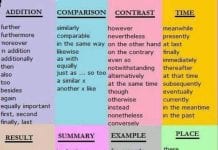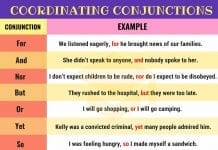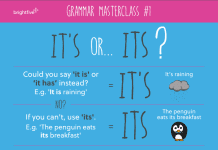
A conjunction is a word that grammatically connects two words, phrases, or clauses together. The most common examples are words like “and” and “but.”
For example, “I took the subway, and got off at 96th Street.” Or, “I took the subway, but there was a delay.” However, conjunctions can come in many forms with many different functions.
They’re a part of speech that can be broken down into several categories, and we’ll explore each one in depth with examples.
Conjunctions can primarily be broken down into three categories:
- Coordinating conjunctions
- Correlative conjunctions
- Subordinating conjunctions
Another category of conjunctions is correlative conjunctions, and we’ve actually seen a few already, like “either…or” and “neither…nor.” These conjunctions come in pairs and join equal items together.
Correlative conjunctions list:
- Either…or
- Whether…or
- Neither…nor
- Both…and
- As…as
- Not only…but also
- No sooner…than
- Hardly…when
EITHER…OR
The correlative conjunction “either…or” is used to join two positive options. For example:
- We can either go to the movies or stay inside and watch Netflix.
- The sound was either a firework or a gunshot.
- Either you stay or I leave.
A common grammatical mistake that occurs when using the correlative conjunction “neither…or” is subject-verb agreement. When two (or more) items are joined by the word conjunction and serve as the subject of the sentence, the number of the verb (i.e. singular or plural) always follows the last of the options. Multiple singular options do not create a plural noun. For example:
- Either Crystal or Julia wants to come with us to the festival. (The verb should be “wants,” not “want”)
- Either Courtney or her friends are coming to pick me up. (The verb “are” follows the second item in the pair of subjects.)
The word “either” can be used by itself, but as a pronoun, not a conjunction. For example:
- You can ask either of us if you need any help.
- “Should I get this shirt in blue or white?” “Either looks good on you.”
WHETHER…OR
The conjunction “whether…or” also pairs up two options, but they must be clauses. It’s similar to the subordinating conjunction “if” in that it brings up hypothetical conditions, but in pairs.
- Whether I drink a lot or a little, my face still gets red.
- Whether it’s sunny out or raining, we’re still going to see the concert.
A common usage of this correlative conjunction is in the form “whether…or not” or simply “whether or not.” For example:
- Whether the earrings are cheap or not, I’m still going to buy them.
- You have to take this class, whether or not you want to.
It’s also acceptable to simply use the word “whether,” which implies the phrase “or not,” by itself. In this case, it becomes a subordinating conjunction instead of a correlative one, which we’ll discuss later on.
- I don’t care whether a man is rich if I want to date him.
NEITHER…NOR
While “either…or” pairs up two positive options, “neither…nor” pairs up two negative options.
- The view at the top of mountain was neither spectacular nor very visible.
- When it comes to movies, I like neither comedies nor romances.
- Neither will the workers go off strike, nor negotiate until they receive a higher pay.
Just as “either” can stand by itself as a pronoun, so can “neither.”
- Neither of the desserts seemed very appealing.
- Neither of us are working on Thanksgiving.
The word “neither” can also be used as an adverb to indicate that something also does not apply in another case. For example:
- “I didn’t do very well on the last exam. Me neither.”
- I never thought that Trump would actually win the election, and neither did my friends.
BOTH…AND
This correlative conjunction is used to join two equal items together.
- The hurricane was devastating both emotionally and economically.
- We went to both the service and the reception afterwards.
- I don’t know why, but both Jane and Colin have stopped talking to me.
AS…AS
If you want to compare two things and say that one contains a certain quality to the same extent as the other, you can use the correlative conjunction “as…as.”
- Anything I put in the refrigerator becomes as cold as ice.
- Jeremy’s probably as tall as any professional basketball player.
- Run as far as you can, but don’t feel pressured to keep going.
NOT ONLY…BUT ALSO
This correlative conjunction is similar to “both…and” and emphasizes that two items belong in a pair.
- Not only did we get lost, but we also ran out of gas with no gas station in sight.
- Not only is he smart, but he’s also talented.
- The TV show has not only good actors but also an incredibly written script.
NO SOONER…THAN
The phrase “no sooner…than” is used to indicate that two events happened simultaneously or in quick succession. For example:
- No sooner had I left the house than it started to thunder.
- No sooner had the pastor begun to speak than a baby started crying in the back.
HARDLY…WHEN
This phrase is another alternative to “no sooner…than.”
- Hardly had I stepped out of the kitchen when I started to smell something burning.
- Hardly had the party started when drinks started spilling on the floor.
























Thanks for helping! I hope I’ll understand what my teacher says.
Yes I will thanks.
Thanx
Great !!!!
Thank you!
Excellent website !!!
Thank you so much! ❤️